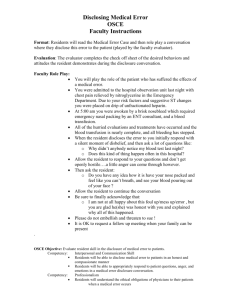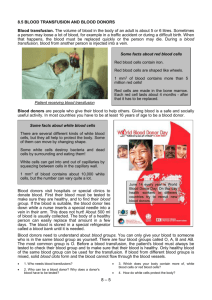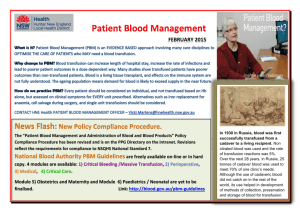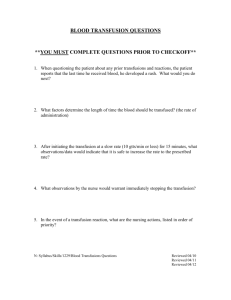Transfusion Medicine and Coagulation Rotation - Objectives Medical Knowledge
advertisement
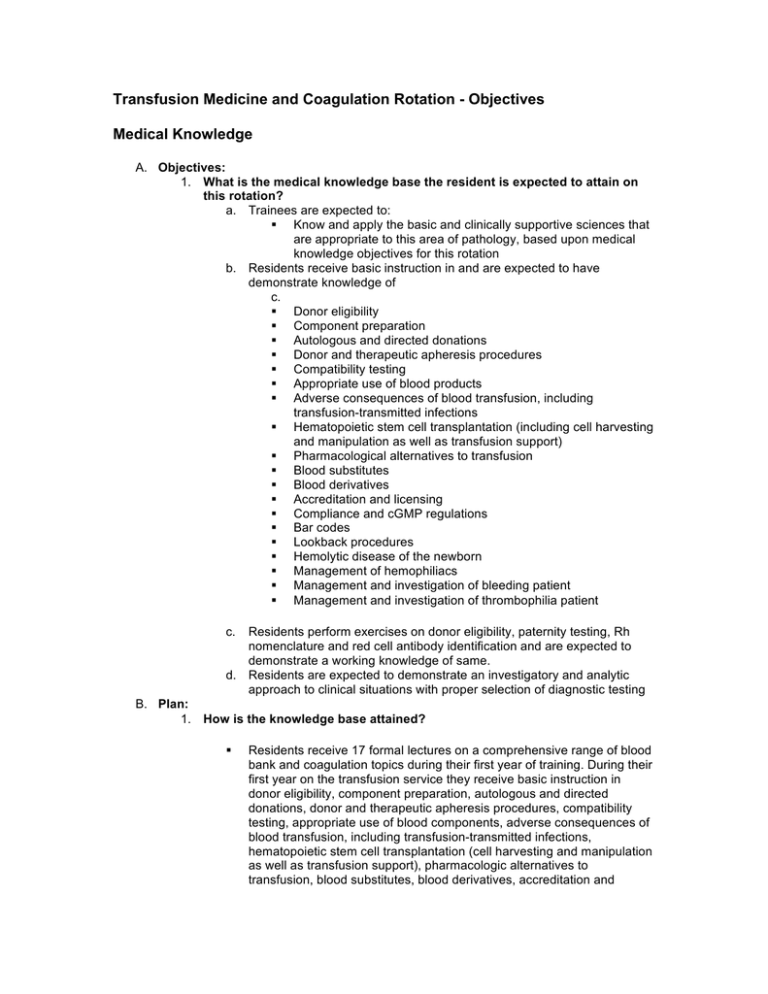
Transfusion Medicine and Coagulation Rotation - Objectives Medical Knowledge A. Objectives: 1. What is the medical knowledge base the resident is expected to attain on this rotation? a. Trainees are expected to: § Know and apply the basic and clinically supportive sciences that are appropriate to this area of pathology, based upon medical knowledge objectives for this rotation b. Residents receive basic instruction in and are expected to have demonstrate knowledge of c. § Donor eligibility § Component preparation § Autologous and directed donations § Donor and therapeutic apheresis procedures § Compatibility testing § Appropriate use of blood products § Adverse consequences of blood transfusion, including transfusion-transmitted infections § Hematopoietic stem cell transplantation (including cell harvesting and manipulation as well as transfusion support) § Pharmacological alternatives to transfusion § Blood substitutes § Blood derivatives § Accreditation and licensing § Compliance and cGMP regulations § Bar codes § Lookback procedures § Hemolytic disease of the newborn § Management of hemophiliacs § Management and investigation of bleeding patient § Management and investigation of thrombophilia patient c. Residents perform exercises on donor eligibility, paternity testing, Rh nomenclature and red cell antibody identification and are expected to demonstrate a working knowledge of same. d. Residents are expected to demonstrate an investigatory and analytic approach to clinical situations with proper selection of diagnostic testing B. Plan: 1. How is the knowledge base attained? § Residents receive 17 formal lectures on a comprehensive range of blood bank and coagulation topics during their first year of training. During their first year on the transfusion service they receive basic instruction in donor eligibility, component preparation, autologous and directed donations, donor and therapeutic apheresis procedures, compatibility testing, appropriate use of blood components, adverse consequences of blood transfusion, including transfusion-transmitted infections, hematopoietic stem cell transplantation (cell harvesting and manipulation as well as transfusion support), pharmacologic alternatives to transfusion, blood substitutes, blood derivatives, accreditation and licensing, compliance and cGMP regulations, bar codes, lookback procedures and hemolytic disease of the newborn. § Exercises on donor eligibility, paternity testing, Rh nomenclature, and red cell antibody identification panels are done. The residents are given a checklist of laboratory activities that they are required to observe at the bench. They may perform hands-on work if they desire. A second 2 mo. advanced rotation in the blood bank has been inaugurated in conjunction with the coagulation rotation. Turing this period, the resident is given additional responsibility for handling the more difficult problems that arise, as well as assisting the junior residents. § During the senior year, residents come back for a combined blood bankcoagulation rotation. During which period they are mainly focusing on coagulation aspect of laboratory evaluation of bleeding and clotting disorders, guiding clinicians in appropriate test selection and ordering, interpretation and management of patients. 2. What is the basic reading requirement for the rotation? § The residents receive objectives and suggested reading for each topic, as well as a post-lecture quiz (not graded). 3. What teaching conferences and lectures are the resident expected to attend? § Series of 17 formal didactic lectures given annually. § Weekly CP Rounds, during which interesting calls from the previous week are discussed and one resident/fellow makes a formal presentation. Fellow/resident will present at least one time during academic year. § Daily morning rounds, during which pending patients, previous evening calls and antibody workups are discussed. § Daily afternoon sign-out rounds, during which apheresis patients are reviewed as well as consultative coagulation cases are discussed. § Twice-monthly transfusion medicine journal club for all residents on blood-bank. § Blood Utilization Review Committee. § Every Monday coagulation rounds B. Assessment: 1. How is the resident’s medical knowledge assessed and by whom? § Resident’s/fellow’s medical knowledge is assessed via daily interaction with attending physicians, apheresis nurses and laboratory personnel during morning rounds, afternoon sigh-out and individual one-on-one interactions.

